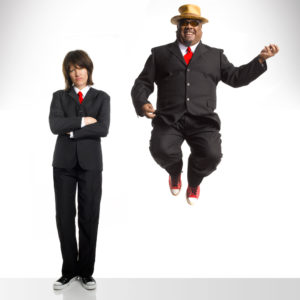“This isn’t the Ken Burns musical documentary on James Baldwin,” said Stew about two-thirds of the way through his latest show, Notes of a Native Song.
He was right. Notes of a Native Song may be many things, but it isn’t a biography of Baldwin (1924 – 1987), the novelist, essayist, playwright, recording artist, and activist who never stopped questioning the treatment of the underprivileged – no matter what their race, gender, or sexuality might be.

The Fringe Festival is billing the show as a “concert novel” about Baldwin, but that only scratches the surface of Stew’s substantial achievement here. While this show is not as polished as Passing Strange, Stew’s Tony-winning Broadway show, it is, in many ways, as important an accomplishment.
Stew is an endearing and fascinating presence at all times, whether he’s singing, discoursing on Baldwin’s life and impact, or ad-libbing jokes about his time in Philadelphia. (The funniest moment came when Stew admitted that, thanks to his visit to the city, he’d finally learned that he’d been mispronouncing “Reading Railroad” every time he’s played Monopoly for decades.)
In Notes of a Native Song, Stew and his four-piece band, The Negro Problem (which includes his songwriting partner Heidi Rodewald), deliver a song cycle that deals with many facets of Baldwin’s life. A few of the songs summarize Baldwin’s works of fiction; others deal with his upbringing and his self-imposed exile in Europe; still others deal with the treatment he got when he returned to America and was confronted with blatant racism for the first time in years. (“Florida, You Kill Me,” which deals with Baldwin’s reception in that state, pivots quickly from raucous comedy to a stark reminder that things haven’t changed much since Baldwin’s time.)
“I’m so fucking tired of James Baldwin,” Stew says early in the show, saying that his research on the author often made him feel stifled as he learned more about “his eloquence, his certainty, his clarity.” The songs analyze Baldwin in intricate ways; instead of simply lionizing him as a trailblazer, Stew delves into the thorny conflicts that made him an outsider in his country and within the civil rights movement.
Martin Luther King, for example, prevented Baldwin from speaking at the March on Washington, possibly because of Baldwin’s homosexuality. Stew responds to the slight by donning a headband with a feathery halo attached – an arch commentary on King’s position in American culture – and singing a song with the punning title “Speaking Poof to Towers.”
Then there’s “King Richard,” which deals with Baldwin’s break with his onetime mentor Richard Wright. As Stew makes clear in a lengthy spoken aside, their conflict was not a personality clash but an intellectual argument about the nature of their work and their duty to the black community. Stew sings:
Along with the shuck and the jive
And the tit for tat
Love keeps black people alive
Can you write about that,
Richard?
As Rodewald says at one point, “This is not a play, there are no characters.” It’s a structured concert, and that structure supports some outstanding music. Rodewald’s melodies are always inviting, and The Negro Problem provides dynamic backing.
Many of the songs start quietly, using a foundation of Stew’s acoustic guitar and Rodewald’s electric bass, then adding bongos, and topping things off with flourishes of electric piano and saxophone. Everyone in the band is terrific, but the standout is Mike McGinnis, who adds virtuoso touches on a number of woodwind instruments. McGinnis’ solo on the sipsi, a Turkish woodwind that sounds like a cross between a clarinet and a kazoo, gives an authentic, exotic flavor to “Istanbul,” a song about Baldwin’s visit to that city.

Joan Grossman’s video design blends vintage film of Baldwin, animation, and new material; like the songs, it sets a mood rather than tells a linear story. K.J. Hardy’s lighting design sets a ghostly mood during a song that chronicles one of Baldwin’s more harrowing visits to the Deep South.
And unlike at many rock and roll shows, Larry Fowler’s sound mix is never overpowering. You’ll hear every word, though those words go by so quickly you may need some time to catch up.
That’s fitting, though. Baldwin didn’t wait for the world to catch up with him, and neither does Stew.
Running Time: Approximately 90 minutes, with no intermission.
Notes of a Native Song played September 8 – 11, 2016, at The Philadelphia Fringe Festival performing at The Wilma Theater – 265 South Broad Street, in Philadelphia, PA.
RATING:
BEST OF THE 2016 PHILADELPHIA FRINGE!




